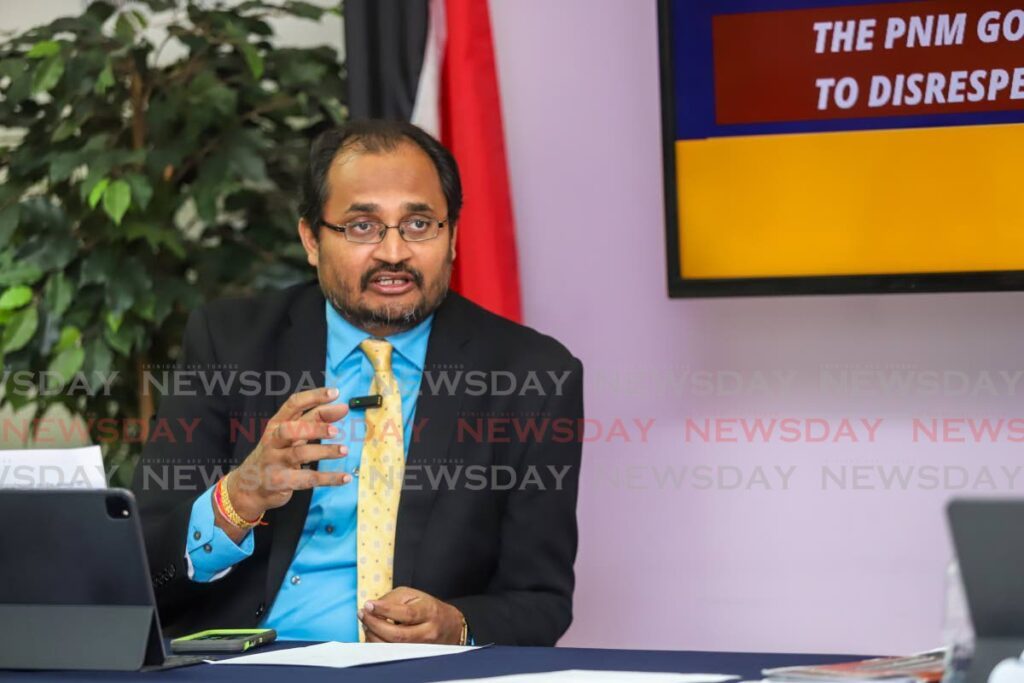A hollow promise of progress

DINESH RAMBALLY
TT FINDS itself at a crossroads yet again, grappling with a projected $9 billion deficit for fiscal year 2024, as revealed in the recent mid-year review by the Minister of Finance. Despite a staggering expenditure exceeding $60 billion, the populace is left disillusioned and disheartened by the glaring absence of tangible improvements in their daily lives.
This dissonance between government spending and public welfare is evident across various sectors, painting a grim picture of systemic neglect and misplaced priorities. Is this the progress that the PNM Government promised?
By the minister’s own words, the next three years are going to be very difficult. During the start of the fiscal year the budget was overly optimistic of the price of gas and oil. The truth be told, the minister was fully aware of this. He is not as clueless as he sounds in Parliament.
The fact is that the price of gas and oil were overestimated on purpose so that he would not have to say the full extent of the deficit back then. He was hoping that by now the Revenue Authority would have been in place, property taxes would have been fully implemented, utility rates would have increased and that would have allowed him to save some political face. Instead, he is relying on the diplomacy of the IMF, which in the conclusion of its statement indicated that we are on a downward trajectory.
The state of TT's road network stands as a testament to governmental apathy and inefficiency. Pothole-riddled streets resemble obstacle courses, wreaking havoc on vehicles and endangering lives. Yet, despite promises of infrastructure development and maintenance, the reality on the ground remains unchanged. Citizens navigate treacherous roads with no reprieve in sight, underscoring the Government's failure to deliver on its basic responsibilities. The Ministry of Works and Transport is to receive $155 million more.
Compounding matters is the pervasive spectre of crime that haunts TT's communities. Despite pledges to bolster law enforcement and combat criminal activity, the nation continues to grapple with alarmingly high crime rates. Citizens live in a perpetual state of fear, disillusioned by the Government's inability to provide adequate security and uphold the rule of law. The cycle of violence perpetuates, eroding trust in public institutions and undermining social cohesion.
In the realm of healthcare, TT faces a crisis of access and quality. Overburdened hospitals struggle to meet the needs of patients, resulting in prolonged waiting times and substandard care. Talk of curtailment of the Chronic Disease Assistance Programme (CDAP) drugs threatens to exacerbate an already dire situation. If implemented it would deprive vulnerable individuals of life-saving medications.
I further warn that any curtailment of CDAP would only signal a callous disregard for public health and underscore the Government's misplaced priorities and disregard for the well-being of its citizens.
Furthermore, the proposed increase in utility rates without commensurate improvements in service delivery adds insult to injury for Trinidadian households. Already burdened by economic hardship, citizens are forced to bear the brunt of rising costs without reaping any benefits. The Government's failure to address systemic inefficiencies and mismanagement within utility companies further exacerbates the plight of the people, perpetuating a cycle of financial hardship and deprivation.
On the horizon looms property tax and the implementation of the Revenue Authority, promising further financial strain for Trinidadian households. While purportedly aimed at bolstering government revenue, these measures threaten to disproportionately impact low and middle-income families already struggling to make ends meet.
Without adequate safeguards and transparent governance structures, such initiatives risk exacerbating social inequality and widening the gap between the haves and have-nots.
In light of these pressing challenges it is evident that TT's fiscal crisis is not just a matter of numbers on a balance sheet; it is a reflection of systemic failures and governmental neglect. The disparity between extravagant spending and pervasive poverty highlights the urgent need for meaningful reforms and accountable governance.
Only through a concerted effort to prioritise the needs of the people and address the root causes of societal malaise can TT hope to navigate its way out of this fiscal quagmire and towards a brighter future for all citizens.
The Ministry of Labour is to receive $130,538,600 more and yet the public service has a plethora of employees who are employed for years on three- and six-month contracts.
Imagine the Service Commission Department is to receive an extra $4,140,000 for legal costs for court matters and to pay for specialised assessment exercises for public officials.
The Office of the Attorney General is to receive $124,300,000, with $120,000,000 for legal fees. But the names of the attorneys are to be kept a secret. Is this how you account for taxpayers' money?
After its almost ten years in office, are you really happy with this government’s stewardship? Do you think you have gotten value for money after the Government has spent more than $500 billion during its term in office? Can you truly say that this is what you voted for?
Dinesh Rambally is the Member of Parliament for Chaguanas West


Comments
"A hollow promise of progress"